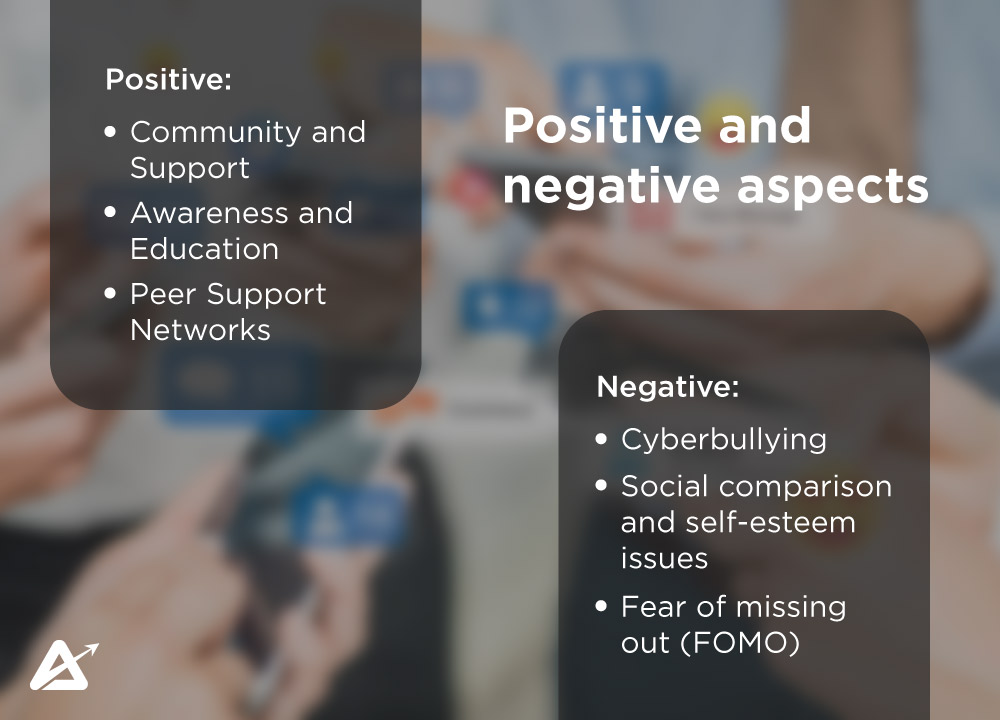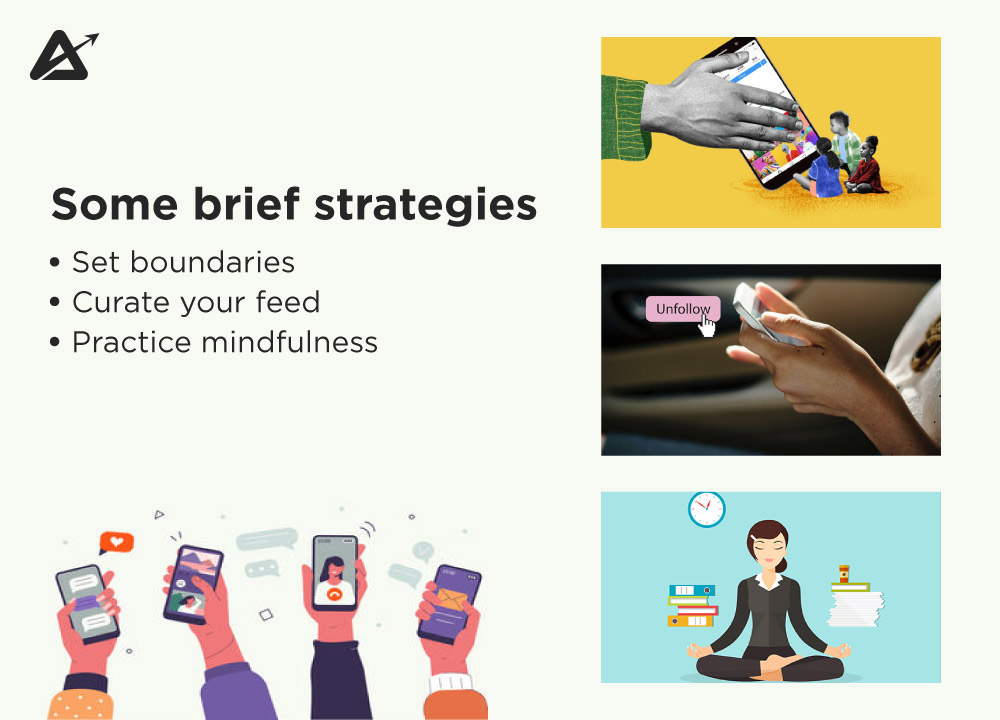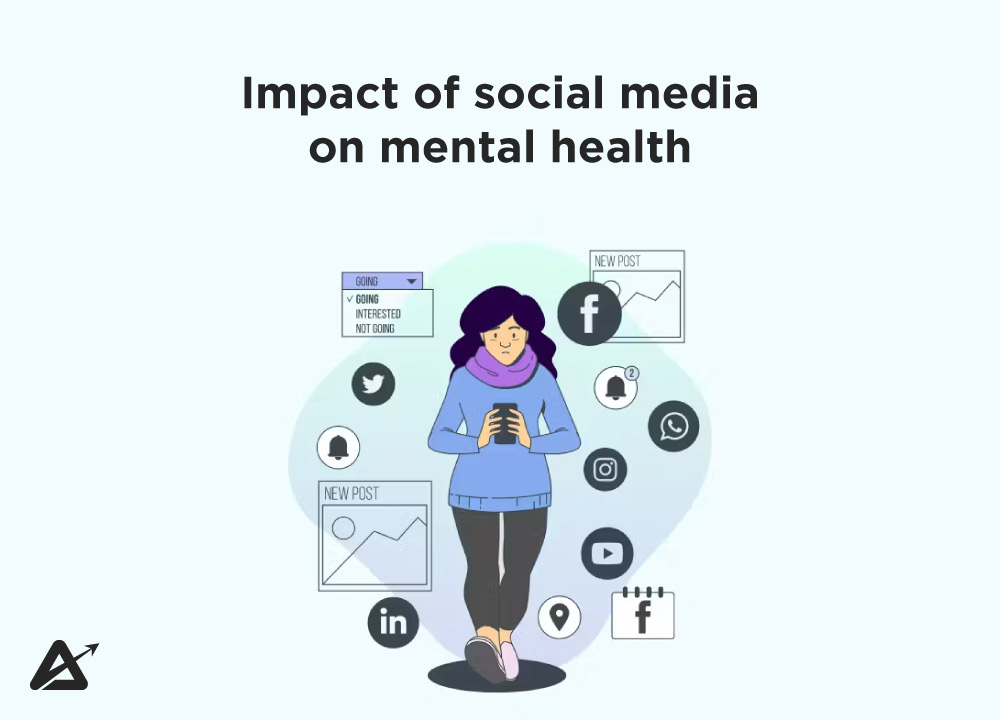The intricate relationship between social media and mental health: Exploring How social media affects mental health? In an era dominated by technology and connectivity, social media has emerged as a pervasive force shaping the way. We communicate and perceive the world. With its ability to connect individuals across the globe and facilitate information sharing. Social media platforms have undoubtedly revolutionized our lives. However, beneath the glossy surface lies a growing concern: the impact of social media on mental health.
This blog delves into the intricate relationship between social media and our well-being. Shedding light on the potential drawbacks that warrant our attention.
Mental Health And Social Media
Social media platforms have significantly impacted our lives, connecting us with others and providing avenues for self-expression. However, the relationship between mental health and social media is complex and can have both positive and negative effects.
On the positive side, social media has created opportunities for support and community building. People dealing with mental health issues can find solace in online groups. Where they can share experiences, seek advice, and receive encouragement from others who understand their struggles. Social media has also allowed for the dissemination of mental health information, reducing stigma and increasing awareness.
However, the excessive use of social media can have detrimental effects on mental health. The constant exposure to carefully curated, idealized versions of others’ lives can contribute to feelings of inadequacy. The pressure to present an “Instagram-worthy” life can lead to social comparison and a distorted perception of reality. Moreover, cyberbullying, online harassment, and the fear of missing out (FOMO) can exacerbate anxiety and depression.
It is crucial to maintain a healthy relationship with social media. Practicing digital self-care involves setting boundaries, such as limiting screen time, unfollowing negative accounts, and taking breaks when needed. Building a strong support system both online and offline is vital for overall mental well-being.
Ultimately, recognizing the impact of social media on mental health is crucial. By promoting a balance between online engagement and offline connection. We can harness the positive aspects of social media while safeguarding our mental well-being.
How Social Media Affects Mental Health
Social media can have both positive and negative effects on mental health. While it provides numerous benefits, such as connecting people, sharing information, and fostering communities, there are several ways in which it can impact mental well-being:
The Social Comparison Trap
Social media platforms often present an idealized version of reality, where individuals carefully curate their lives, showcasing the most picturesque moments. The constant exposure to these polished representations can lead to feelings of inadequacy, as users compare their own lives, achievements, and appearances to the highlight reels of others. This comparison trap can fuel self-doubt, lower self-esteem, and breed a constant need for validation, fostering negative mental health outcomes.
Fear Of Missing Out (FOMO)
The fear of missing out, or FOMO, is another psychological phenomenon exacerbated by social media. As we scroll through feeds filled with exciting events, travel adventures, and social gatherings, we may experience a sense of exclusion or unease about not being part of these experiences. This fear can contribute to anxiety, stress, and a constant need to stay connected, leading to a persistent feeling of being left behind.
Cyberbullying And Online Harassment
Social media platforms provide a virtual space for individuals to express their opinions, but unfortunately, this can also foster negativity and harassment. Cyberbullying, trolling, and online harassment have become distressingly common, causing significant emotional distress and psychological harm. The anonymity afforded by social media can embolden individuals to engage in hurtful behavior, leaving victims vulnerable to anxiety, depression, and even suicidal ideation.
Addiction And Compulsive Use
The addictive nature of social media platforms, with their continuous streams of notifications, likes, and comments, can lead to excessive use and dependency. This can negatively impact productivity, sleep patterns, and overall well-being.
Unrealistic Beauty Standards
Social media platforms often promote unattainable beauty standards, which can contribute to body dissatisfaction, eating disorders, and poor self-image.
Distorted Body Image And Eating Disorders
The proliferation of unrealistic beauty standards on social media can negatively impact body image perceptions, particularly among vulnerable populations. Constant exposure to images of perfectly sculpted bodies, flawless skin, and edited photographs can fuel body dissatisfaction and contribute to the development of eating disorders such as anorexia nervosa and bulimia. This digital distortion of reality can foster a toxic relationship with one’s own body, leading to severe mental health consequences.
Sleep Disturbances And Addiction
The addictive nature of social media, characterized by endless scrolling and the desire for constant engagement, can disrupt sleep patterns and quality. The blue light emitted by screens interferes with the production of melatonin, a hormone essential for a good night’s sleep, leading to sleep disturbances. Additionally, the compulsive need to check notifications and stay connected can result in social media addiction, impacting productivity, focus, and overall mental well-being.
Social Isolation Paradox
Although social media facilitates connections, excessive reliance on online interactions may reduce face-to-face social interactions. This paradoxical effect can lead to feelings of loneliness, social isolation, and poor mental health.
Information Overload And Misinformation
Social media bombards users with a constant influx of information, some of which may be inaccurate or misleading. This information overload and exposure to false information can lead to confusion, stress, and anxiety.
However, it’s important to note that the impact of social media on mental health varies among individuals. Factors such as pre-existing mental health conditions, individual susceptibility, and patterns of use can influence how someone is affected. Responsible and mindful usage, setting boundaries, and seeking support when needed can help mitigate potential negative effects.
The Role Social Media Plays In Mental Health
Social media has become an integral part of our daily lives, connecting us with friends, family, and a vast online community. However, its impact on mental health is a topic of increasing concern. On one hand, social media offers a platform for self-expression, support, and sharing experiences. It can foster a sense of belonging and provide valuable resources for those struggling with mental health issues. On the other hand, excessive use of social media has been linked to various negative effects on mental well-being. The constant exposure to carefully curated highlight reels, social comparisons, cyberbullying, and the fear of missing out can contribute to feelings of inadequacy, low self-esteem, anxiety, and depression. It is crucial for individuals to be mindful of their social media usage, set healthy boundaries, and seek real-life connections to maintain a balanced approach to their mental health.
Social Media Can Increase Feelings Of Loneliness
Social media, despite its promise of interconnectedness, has been found to exacerbate feelings of loneliness in many individuals. While it provides an avenue for virtual socialization, it often falls short of fulfilling genuine human connection. The curated nature of posts and the constant exposure to the highlight reels of others’ lives can lead to social comparison and feelings of inadequacy. Moreover, superficial interactions and a lack of meaningful engagement on social media platforms can leave individuals craving deeper connections. Paradoxically, excessive time spent on social media can lead to increased isolation and a sense of disconnectedness from the real world. It is essential to recognize the potential negative impact of social media on mental health and balance its use with real-life interactions to foster genuine connections and combat loneliness.
The Positive Aspects Of Social Media For Mental Health

- Community and Support: Social media platforms provide spaces where individuals with similar interests, experiences, or mental health challenges can connect and support one another. These communities can offer a sense of belonging, reducing feelings of isolation and fostering empathy.
- Awareness and Education: Social media can raise awareness about mental health issues, debunk myths, and provide accurate information. People can access resources, articles, and expert advice, which can contribute to understanding and destigmatizing mental health conditions.
- Peer Support Networks: Many social media platforms host groups or pages where individuals can seek advice, share personal stories, and offer support to one another. This peer support can be particularly valuable for individuals who may not have access to in-person support networks.
- Expression and Creativity: Social media platforms allow users to express themselves creatively through various mediums like writing, art, photography, and video. This self-expression can serve as a therapeutic outlet, promoting self-discovery and emotional well-being.
- Positive Content and Inspiration: Social media is filled with uplifting and inspiring content, including motivational quotes, personal success stories, and messages of encouragement. These can serve as reminders of resilience and inspire individuals to take positive steps toward improving their mental health.
- Access to Mental Health Resources: Social media can serve as a gateway to mental health resources, including helplines, counseling services, and online therapy platforms. Individuals can find information about available support and seek professional help more easily.
In addition, blue light therapy has shown promise in managing the symptoms of rosacea by reducing inflammation and improving overall skin appearance. You may also want to know about Blue Light Therapy for Rosacea – An Ultimate Guide.
The Negative Aspects Of Social Media For Mental Health
- Cyberbullying
- Social comparison and self-esteem issues
- Fear of missing out (FOMO)
- Addiction and excessive use
- Sleep disturbances
- Increased feelings of loneliness and isolation
- Negative body image and appearance anxiety
- Online harassment and trolling
- Information overload and cognitive overload
- Unrealistic portrayals of life and unattainable standards
Signs That Social Media Is Impacting Your Mental Health
- Increased feelings of envy or jealousy: Constant exposure to others’ seemingly perfect lives on social media can lead to feelings of inadequacy and envy, negatively impacting your self-esteem and mental well-being.
- Decreased self-esteem: Comparing yourself to others’ highlight reels on social media can make you feel insecure about your own life, appearance, or achievements, leading to a decline in self-esteem.
- FOMO (Fear of Missing Out): Regularly seeing posts about social events or activities you were not invited to can trigger feelings of exclusion, loneliness, and FOMO, causing anxiety and dissatisfaction with your own social life.
- Negative body image: Endlessly scrolling through images of seemingly flawless bodies on social media can contribute to body dissatisfaction, leading to poor body image and potentially triggering or worsening eating disorders or body dysmorphia.
- Increased anxiety and stress: Constant exposure to news updates, online debates, or cyberbullying on social media platforms can overwhelm and stress you out, leading to heightened anxiety levels and negatively impacting your mental health.
- Sleep disturbances: Spending excessive time on social media, especially before bedtime, can disrupt your sleep patterns and quality, leading to fatigue, irritability, and difficulty concentrating during the day.
- Decreased productivity: Frequent distractions from social media notifications and excessive time spent scrolling through feeds can significantly impact your ability to focus, leading to decreased productivity and increased procrastination.
- Isolation and reduced face-to-face social interactions: Over-reliance on social media for socializing can lead to reduced in-person interactions, feelings of isolation, and a lack of meaningful connections, which are vital for mental health.
- Cyberbullying and harassment: Social media platforms can be breeding grounds for cyberbullying, harassment, and online trolling. Constant exposure to negative comments or online abuse can have a detrimental impact on your mental well-being.
Modifying Social Media Use Can Significantly Enhance Mental Health. Here Are Some Brief Strategies To Achieve This

Set boundaries: Establish specific time limits for social media usage. Allocate designated periods for browsing and engaging in other activities during the remaining time.
Curate your feed: Unfollow accounts that promote negative feelings or comparisons. Instead, follow pages that inspire you, provide educational content, or focus on well-being and positivity.
Practice mindfulness: Before scrolling, take a moment to check in with yourself. Be aware of your emotions and intentions, and ensure that you’re in a positive mindset before engaging with social media.
Engage consciously: Actively participate in positive interactions by leaving encouraging comments, sharing helpful content, or joining supportive communities. Seek out opportunities to contribute positively to the social media environment.
Prioritize real-life connections: Dedicate time to nurture relationships outside of social media. Plan activities with friends and loved ones, participate in hobbies and engage in meaningful conversations offline.
Take breaks: Incorporate regular social media detoxes into your routine. Disconnecting for a day, weekend, or longer periods can refresh your mind, reduce stress, and enhance overall well-being.
Seek support: If you’re struggling with your mental health, reach out to a professional therapist or counselor. They can provide guidance tailored to your needs and help you navigate challenges related to social media use.
There are also good LED light therapies for rosacea that you can use to take care of your skin. Read the Is Light Therapy Good for Rosacea blog to find out if LED light therapy is really good for your skin.
Several Potential Benefits For Mental Health
- Improved mood and emotional well-being.
- Reduced stress and anxiety levels.
- Enhanced cognitive function and mental clarity.
- Increased self-awareness and self-esteem.
- Better sleep quality and regulation.
- Enhanced coping skills and resilience.
- Improved interpersonal relationships and social support.
- Decreased symptoms of depression and loneliness.
- Increased mindfulness and present moment awareness.
- Greater overall life satisfaction and happiness.
Conclusion
While social media has undoubtedly revolutionized the way we communicate and connect, it is crucial to recognize and address its potential impact on mental health. The comparison trap, FOMO, cyberbullying, distorted body image, sleep disturbances, and addiction are just a few of the challenges we face in the digital age. As users, it is essential to be mindful of our social media usage, cultivate healthy digital habits, and seek support when needed.
At the same time, social media platforms and technology companies have a responsibility to prioritize user well-being. Implementing features such as time limits, content warnings, and improved reporting mechanisms can contribute to creating a safer and healthier online environment.
By fostering a balanced relationship with social media, we can harness its benefits while protecting our mental health. Let us strive for a digital landscape that promotes connection, authenticity, and empathy, ensuring that social media becomes a force for good in our lives.
Remember, taking care of our mental health is as important as staying connected in the digital world.






